MBA623 Healthcare Management: Obesity Public Health Report
VerifiedAdded on 2022/11/01
|11
|807
|153
Report
AI Summary
This report provides a comprehensive overview of the global obesity epidemic, highlighting its alarming prevalence and the significant health risks associated with it, including type II diabetes, cardiovascular diseases, and various cancers. It examines the factors contributing to the rise in obesity, such as unhealthy diets and lack of physical activity, while also discussing the double burden faced by low and middle-income nations. The report analyzes the impact of obesity on various populations, including both adults and children, and explores different strategies for prevention and treatment, such as policy actions, health education, and promoting healthy eating habits. It emphasizes the importance of community awareness and the role of individuals and healthcare systems in combating this global health issue.

Paraphrase This Document
Need a fresh take? Get an instant paraphrase of this document with our AI Paraphraser
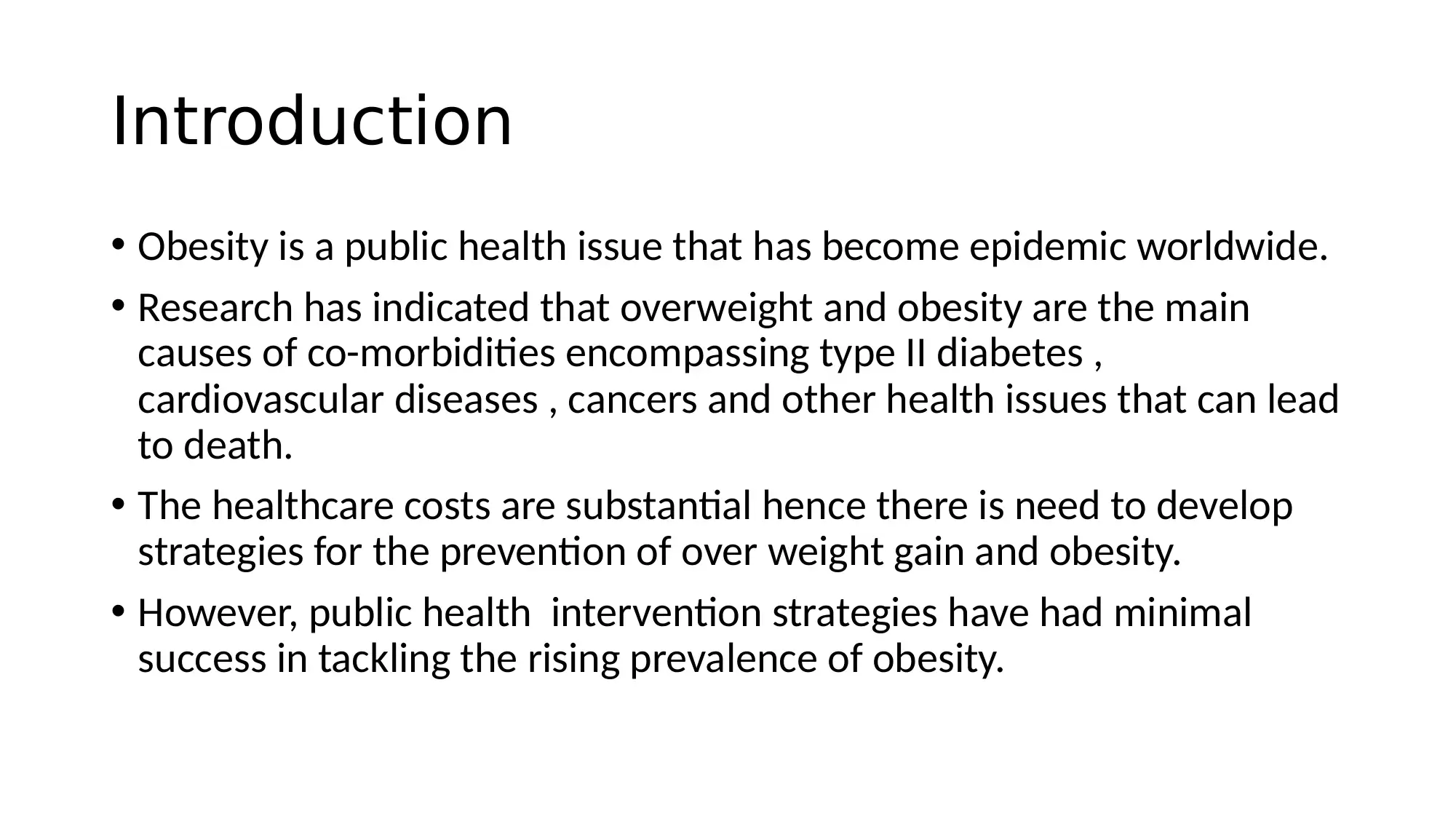
Introduction
• Obesity is a public health issue that has become epidemic worldwide.
• Research has indicated that overweight and obesity are the main
causes of co-morbidities encompassing type II diabetes ,
cardiovascular diseases , cancers and other health issues that can lead
to death.
• The healthcare costs are substantial hence there is need to develop
strategies for the prevention of over weight gain and obesity.
• However, public health intervention strategies have had minimal
success in tackling the rising prevalence of obesity.
• Obesity is a public health issue that has become epidemic worldwide.
• Research has indicated that overweight and obesity are the main
causes of co-morbidities encompassing type II diabetes ,
cardiovascular diseases , cancers and other health issues that can lead
to death.
• The healthcare costs are substantial hence there is need to develop
strategies for the prevention of over weight gain and obesity.
• However, public health intervention strategies have had minimal
success in tackling the rising prevalence of obesity.
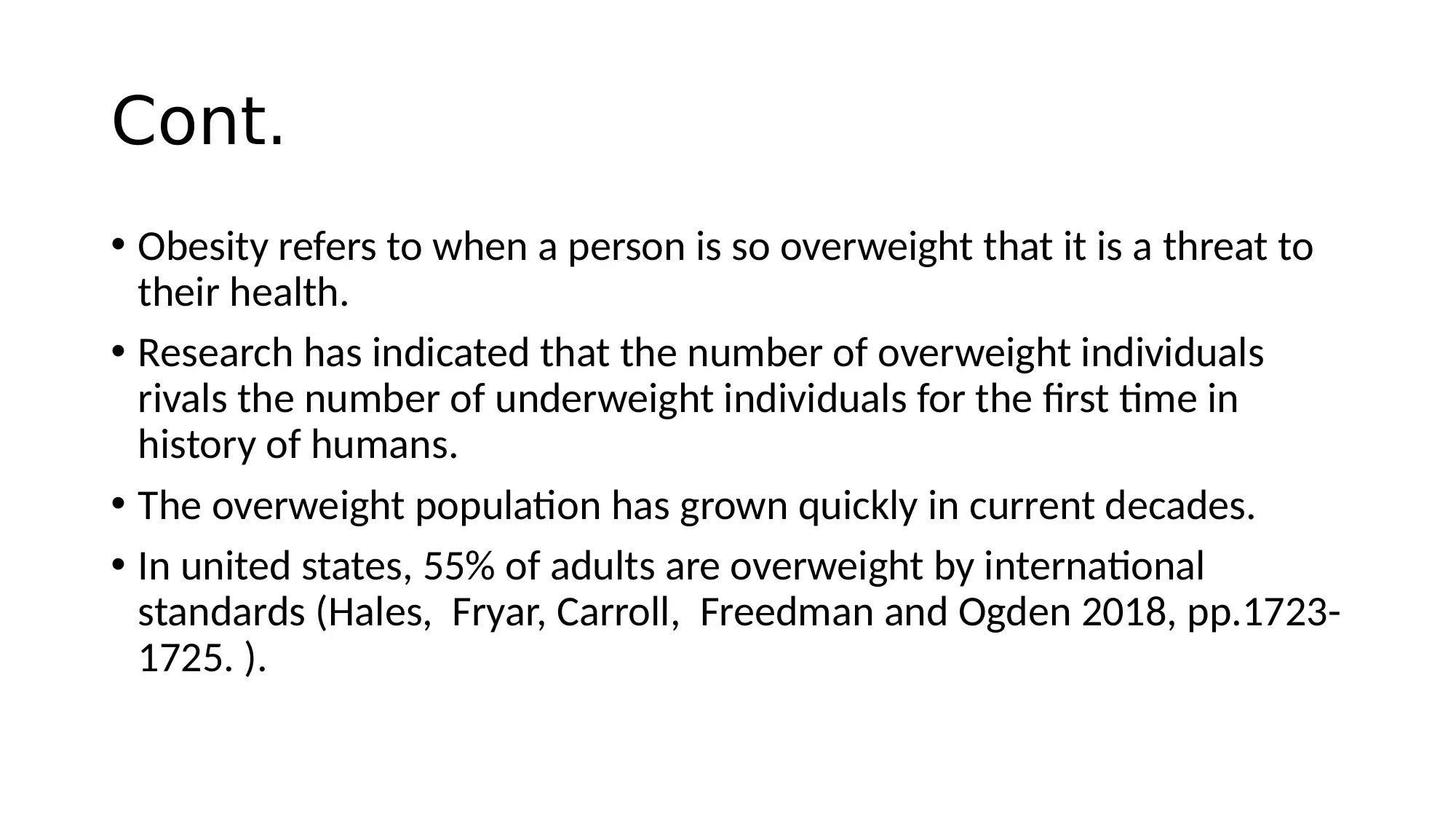
Cont.
• Obesity refers to when a person is so overweight that it is a threat to
their health.
• Research has indicated that the number of overweight individuals
rivals the number of underweight individuals for the first time in
history of humans.
• The overweight population has grown quickly in current decades.
• In united states, 55% of adults are overweight by international
standards (Hales, Fryar, Carroll, Freedman and Ogden 2018, pp.1723-
1725. ).
• Obesity refers to when a person is so overweight that it is a threat to
their health.
• Research has indicated that the number of overweight individuals
rivals the number of underweight individuals for the first time in
history of humans.
• The overweight population has grown quickly in current decades.
• In united states, 55% of adults are overweight by international
standards (Hales, Fryar, Carroll, Freedman and Ogden 2018, pp.1723-
1725. ).
⊘ This is a preview!⊘
Do you want full access?
Subscribe today to unlock all pages.

Trusted by 1+ million students worldwide
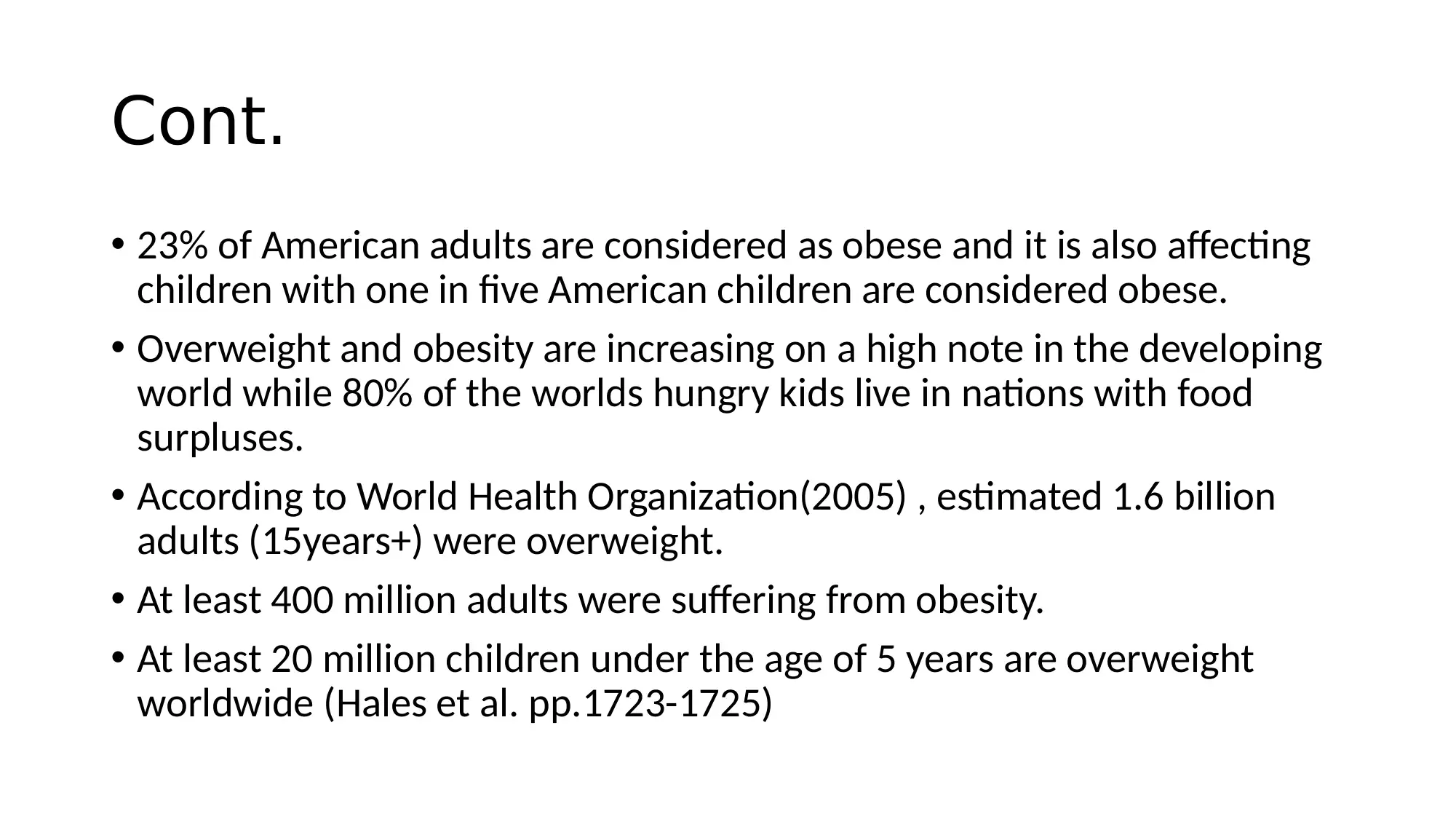
Cont.
• 23% of American adults are considered as obese and it is also affecting
children with one in five American children are considered obese.
• Overweight and obesity are increasing on a high note in the developing
world while 80% of the worlds hungry kids live in nations with food
surpluses.
• According to World Health Organization(2005) , estimated 1.6 billion
adults (15years+) were overweight.
• At least 400 million adults were suffering from obesity.
• At least 20 million children under the age of 5 years are overweight
worldwide (Hales et al. pp.1723-1725)
• 23% of American adults are considered as obese and it is also affecting
children with one in five American children are considered obese.
• Overweight and obesity are increasing on a high note in the developing
world while 80% of the worlds hungry kids live in nations with food
surpluses.
• According to World Health Organization(2005) , estimated 1.6 billion
adults (15years+) were overweight.
• At least 400 million adults were suffering from obesity.
• At least 20 million children under the age of 5 years are overweight
worldwide (Hales et al. pp.1723-1725)
Paraphrase This Document
Need a fresh take? Get an instant paraphrase of this document with our AI Paraphraser
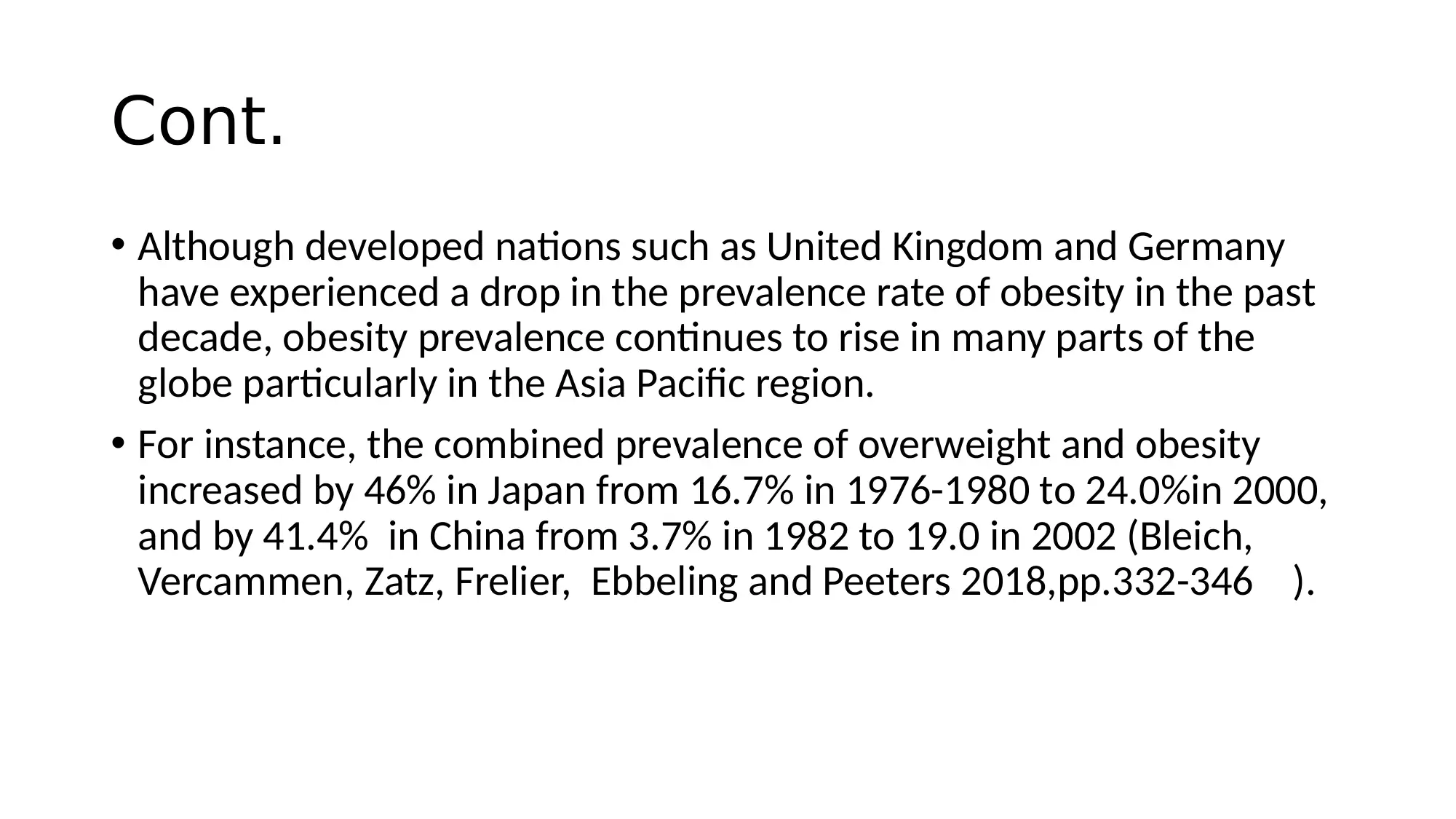
Cont.
• Although developed nations such as United Kingdom and Germany
have experienced a drop in the prevalence rate of obesity in the past
decade, obesity prevalence continues to rise in many parts of the
globe particularly in the Asia Pacific region.
• For instance, the combined prevalence of overweight and obesity
increased by 46% in Japan from 16.7% in 1976-1980 to 24.0%in 2000,
and by 41.4% in China from 3.7% in 1982 to 19.0 in 2002 (Bleich,
Vercammen, Zatz, Frelier, Ebbeling and Peeters 2018,pp.332-346 ).
• Although developed nations such as United Kingdom and Germany
have experienced a drop in the prevalence rate of obesity in the past
decade, obesity prevalence continues to rise in many parts of the
globe particularly in the Asia Pacific region.
• For instance, the combined prevalence of overweight and obesity
increased by 46% in Japan from 16.7% in 1976-1980 to 24.0%in 2000,
and by 41.4% in China from 3.7% in 1982 to 19.0 in 2002 (Bleich,
Vercammen, Zatz, Frelier, Ebbeling and Peeters 2018,pp.332-346 ).
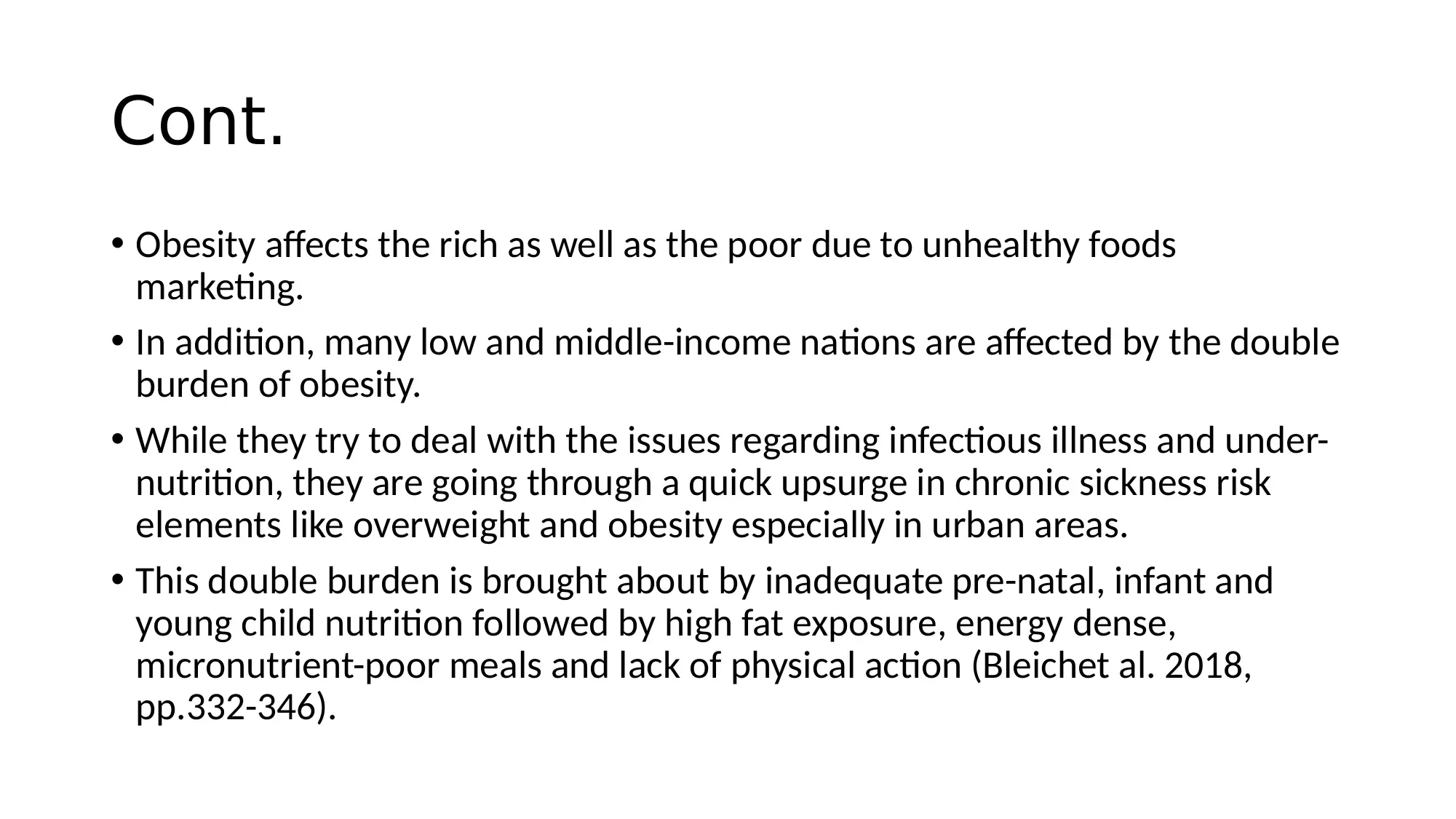
Cont.
• Obesity affects the rich as well as the poor due to unhealthy foods
marketing.
• In addition, many low and middle-income nations are affected by the double
burden of obesity.
• While they try to deal with the issues regarding infectious illness and under-
nutrition, they are going through a quick upsurge in chronic sickness risk
elements like overweight and obesity especially in urban areas.
• This double burden is brought about by inadequate pre-natal, infant and
young child nutrition followed by high fat exposure, energy dense,
micronutrient-poor meals and lack of physical action (Bleichet al. 2018,
pp.332-346).
• Obesity affects the rich as well as the poor due to unhealthy foods
marketing.
• In addition, many low and middle-income nations are affected by the double
burden of obesity.
• While they try to deal with the issues regarding infectious illness and under-
nutrition, they are going through a quick upsurge in chronic sickness risk
elements like overweight and obesity especially in urban areas.
• This double burden is brought about by inadequate pre-natal, infant and
young child nutrition followed by high fat exposure, energy dense,
micronutrient-poor meals and lack of physical action (Bleichet al. 2018,
pp.332-346).
⊘ This is a preview!⊘
Do you want full access?
Subscribe today to unlock all pages.

Trusted by 1+ million students worldwide
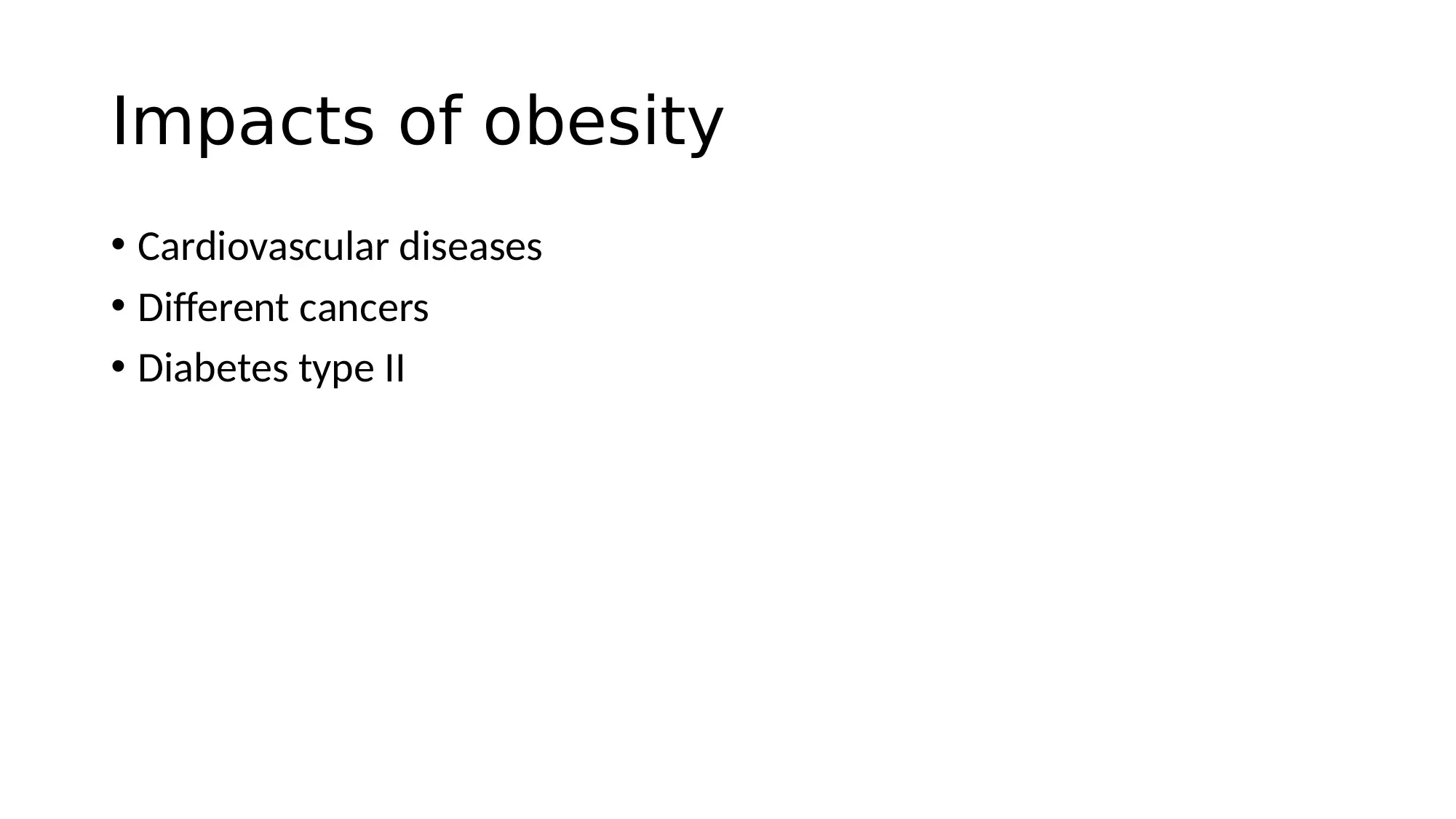
Impacts of obesity
• Cardiovascular diseases
• Different cancers
• Diabetes type II
• Cardiovascular diseases
• Different cancers
• Diabetes type II
Paraphrase This Document
Need a fresh take? Get an instant paraphrase of this document with our AI Paraphraser
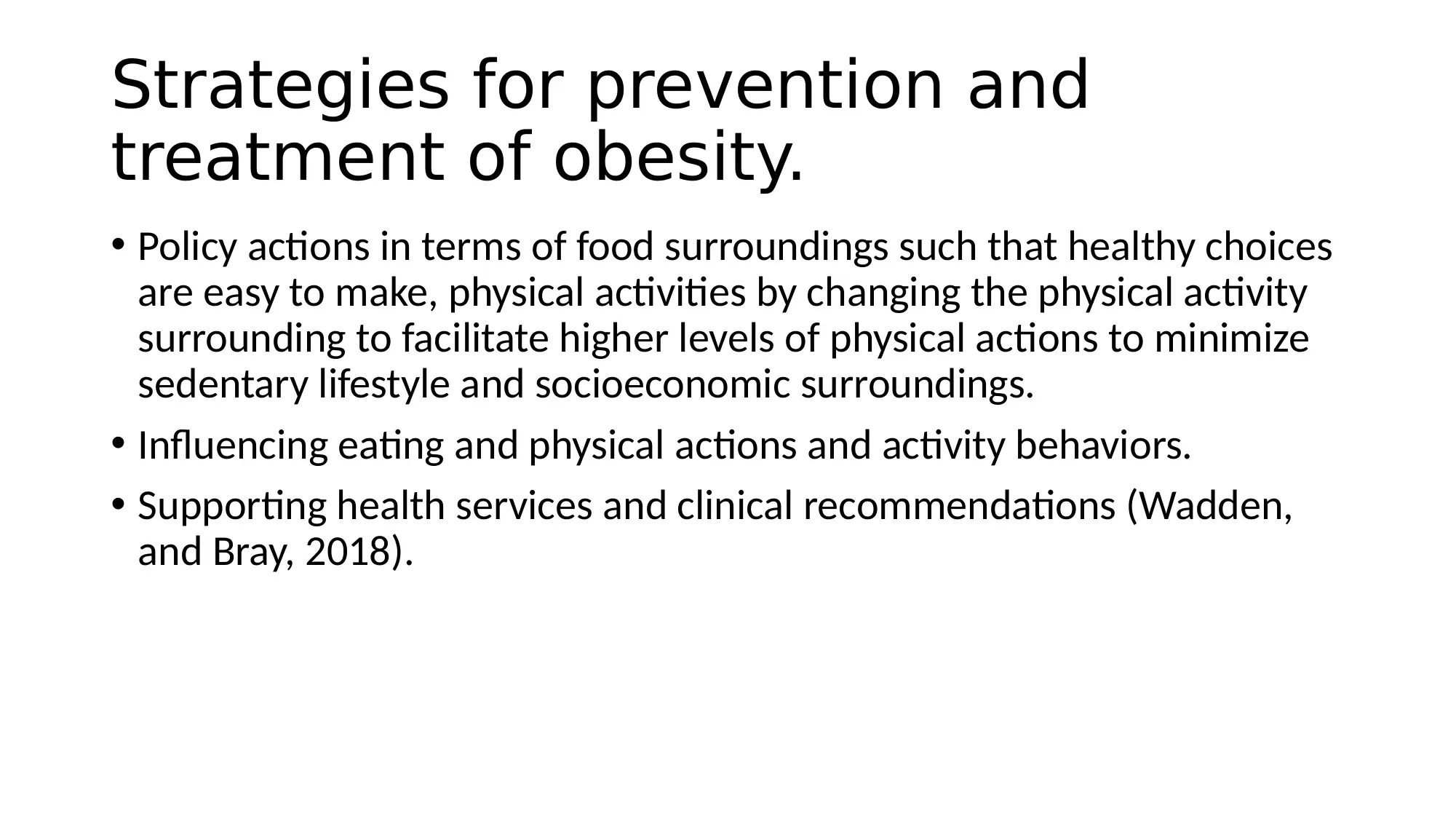
Strategies for prevention and
treatment of obesity.
• Policy actions in terms of food surroundings such that healthy choices
are easy to make, physical activities by changing the physical activity
surrounding to facilitate higher levels of physical actions to minimize
sedentary lifestyle and socioeconomic surroundings.
• Influencing eating and physical actions and activity behaviors.
• Supporting health services and clinical recommendations (Wadden,
and Bray, 2018).
treatment of obesity.
• Policy actions in terms of food surroundings such that healthy choices
are easy to make, physical activities by changing the physical activity
surrounding to facilitate higher levels of physical actions to minimize
sedentary lifestyle and socioeconomic surroundings.
• Influencing eating and physical actions and activity behaviors.
• Supporting health services and clinical recommendations (Wadden,
and Bray, 2018).
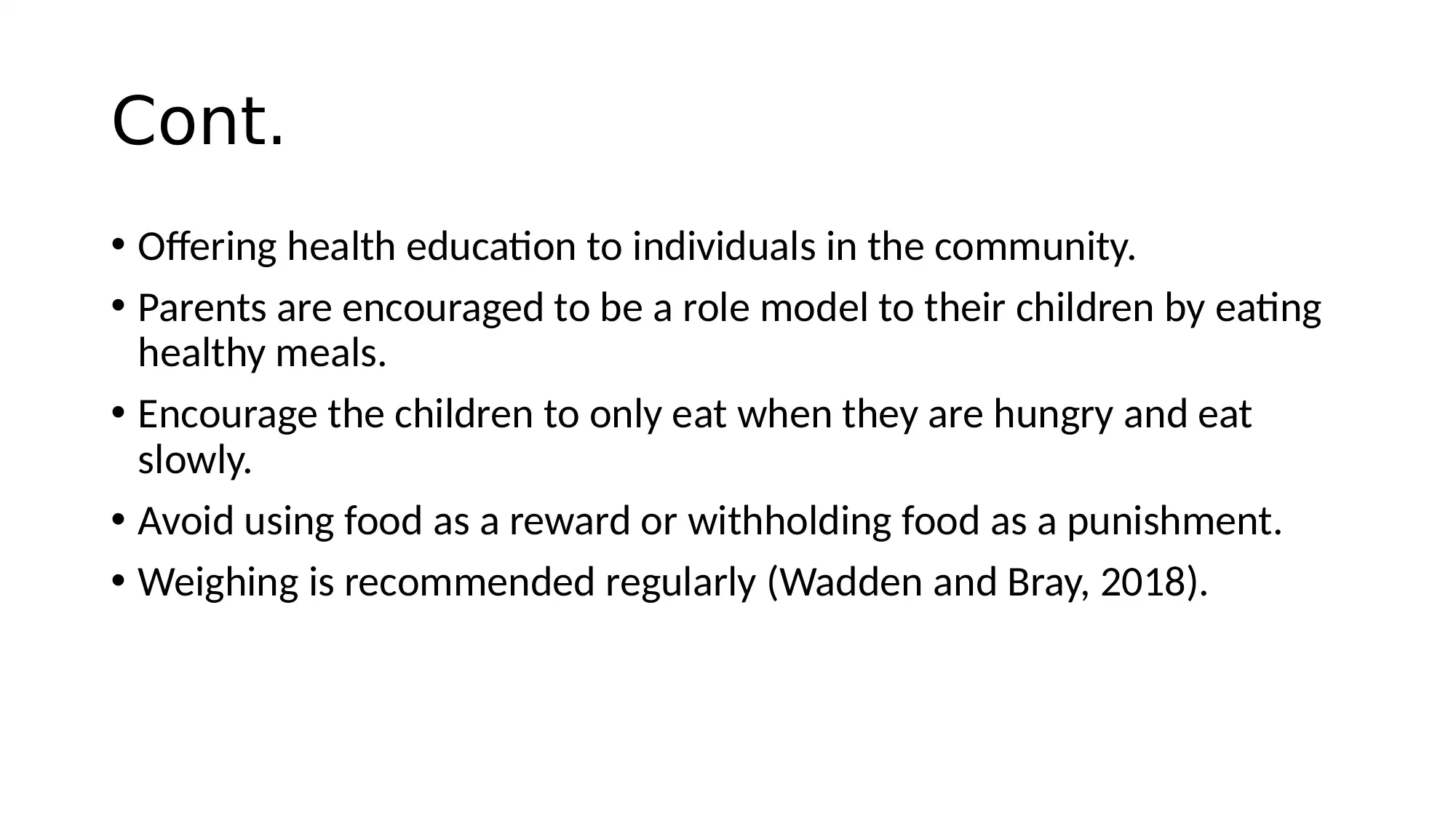
Cont.
• Offering health education to individuals in the community.
• Parents are encouraged to be a role model to their children by eating
healthy meals.
• Encourage the children to only eat when they are hungry and eat
slowly.
• Avoid using food as a reward or withholding food as a punishment.
• Weighing is recommended regularly (Wadden and Bray, 2018).
• Offering health education to individuals in the community.
• Parents are encouraged to be a role model to their children by eating
healthy meals.
• Encourage the children to only eat when they are hungry and eat
slowly.
• Avoid using food as a reward or withholding food as a punishment.
• Weighing is recommended regularly (Wadden and Bray, 2018).
⊘ This is a preview!⊘
Do you want full access?
Subscribe today to unlock all pages.

Trusted by 1+ million students worldwide
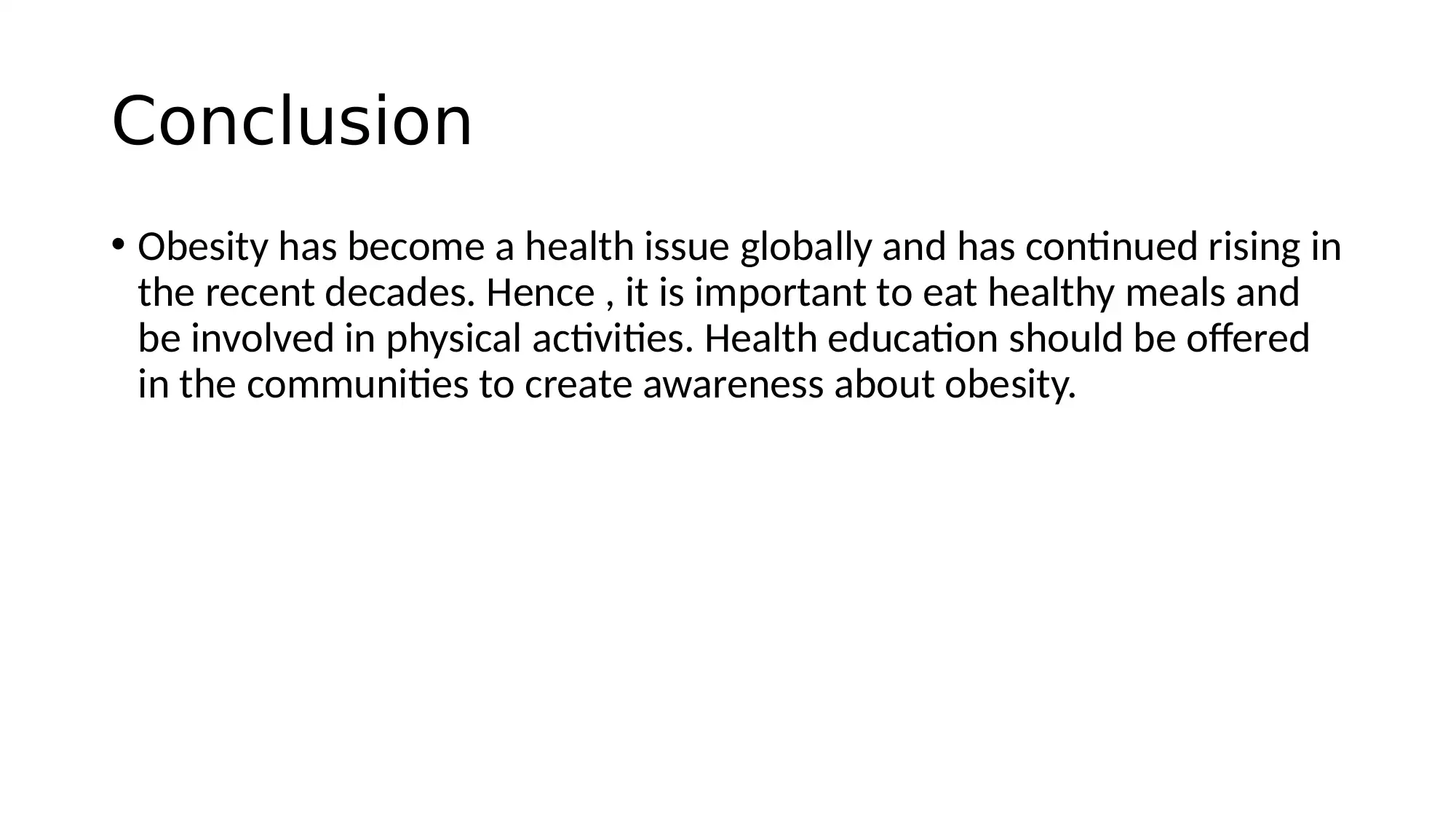
Conclusion
• Obesity has become a health issue globally and has continued rising in
the recent decades. Hence , it is important to eat healthy meals and
be involved in physical activities. Health education should be offered
in the communities to create awareness about obesity.
• Obesity has become a health issue globally and has continued rising in
the recent decades. Hence , it is important to eat healthy meals and
be involved in physical activities. Health education should be offered
in the communities to create awareness about obesity.
Paraphrase This Document
Need a fresh take? Get an instant paraphrase of this document with our AI Paraphraser
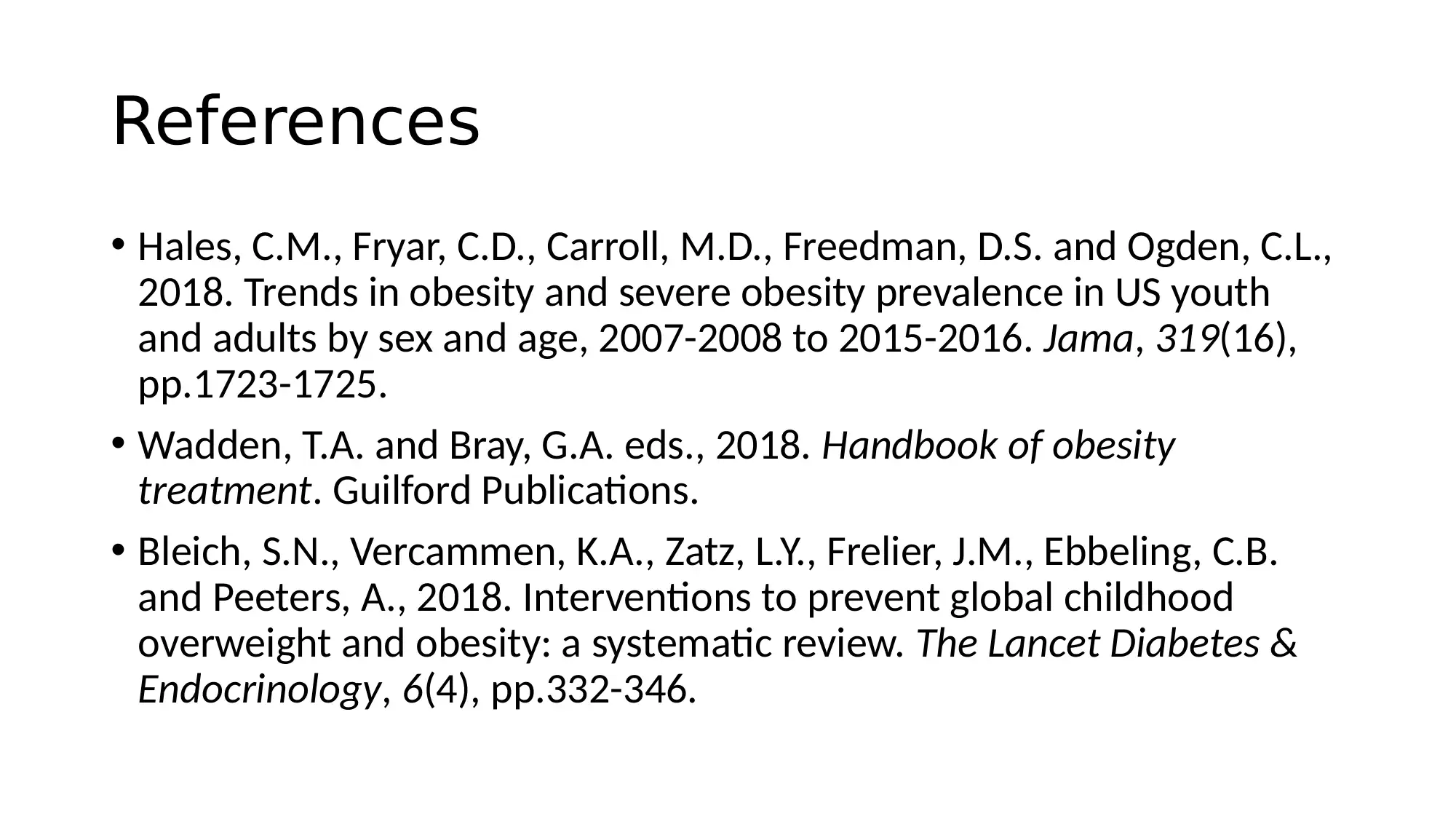
References
• Hales, C.M., Fryar, C.D., Carroll, M.D., Freedman, D.S. and Ogden, C.L.,
2018. Trends in obesity and severe obesity prevalence in US youth
and adults by sex and age, 2007-2008 to 2015-2016. Jama, 319(16),
pp.1723-1725.
• Wadden, T.A. and Bray, G.A. eds., 2018. Handbook of obesity
treatment. Guilford Publications.
• Bleich, S.N., Vercammen, K.A., Zatz, L.Y., Frelier, J.M., Ebbeling, C.B.
and Peeters, A., 2018. Interventions to prevent global childhood
overweight and obesity: a systematic review. The Lancet Diabetes &
Endocrinology, 6(4), pp.332-346.
• Hales, C.M., Fryar, C.D., Carroll, M.D., Freedman, D.S. and Ogden, C.L.,
2018. Trends in obesity and severe obesity prevalence in US youth
and adults by sex and age, 2007-2008 to 2015-2016. Jama, 319(16),
pp.1723-1725.
• Wadden, T.A. and Bray, G.A. eds., 2018. Handbook of obesity
treatment. Guilford Publications.
• Bleich, S.N., Vercammen, K.A., Zatz, L.Y., Frelier, J.M., Ebbeling, C.B.
and Peeters, A., 2018. Interventions to prevent global childhood
overweight and obesity: a systematic review. The Lancet Diabetes &
Endocrinology, 6(4), pp.332-346.
1 out of 11
Related Documents
Your All-in-One AI-Powered Toolkit for Academic Success.
+13062052269
info@desklib.com
Available 24*7 on WhatsApp / Email
![[object Object]](/_next/static/media/star-bottom.7253800d.svg)
Unlock your academic potential
Copyright © 2020–2026 A2Z Services. All Rights Reserved. Developed and managed by ZUCOL.





